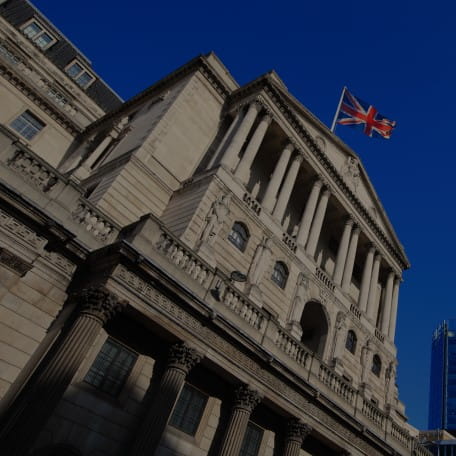At the start of 2024, as many as seven interest rate cuts were expected from the Bank of England. Yet a third of the way through the year, we are still to see any move from the 5.25% rate in place since the last of 14 consecutive hikes in August 2023. When will rate cuts arrive, and how many should we expect?
The Bank of England’s (BoE) Official Bank Rate is closely watched as a benchmark which affects a wide range of saving and lending products throughout the UK. It plays an important part in stimulating or cooling down economic activity and helping the BoE pursue its target of 2% inflation as set by the government.
While every individual in the country is, to a greater or lesser degree, affected by the interest rate set by the BoE, homeowners are among the most sensitive to changes. This cohort – around a quarter of UK adults – saw a leap in rates in September 2022 (a two-year fix rose from around 3.7% to 5.9% by November) after then prime minister Liz Truss and her chancellor Kwasi Kwarteng unveiled their much derided mini-budget. Mortgage rates have since remained at elevated levels due to a global phenomenon of unexpectedly persistent inflation, and the growing expectation of interest rates staying ‘higher for longer’.
There appeared to be some relief for homeowners at the tail end of 2024, with economists beginning to interpret decelerating inflation data as allowing scope for imminent rate cuts, and a number of banks cutting mortgage rates. Yet this week we saw many major lenders change tack and raise mortgage costs again.
Behind this mortgage market reversal lies a shift in financial markets since January that’s seen expectations for Bank of England rate cuts in 2024 drop from seven to just two. On the face of it, the macroeconomic backdrop doesn’t seem to have changed dramatically this year: inflation continues to fall towards target while growth cools.
But this is happening more slowly than expected. UK consumer price inflation eased to an annual rate of 3.2% in March, its lowest level since September 2021 but above economist forecasts of 3.1%. Likewise in the US, consumer prices rose 3.5% in the year to March, ahead of the 3.4% expected.
Perhaps most significantly, the contractionary economic impact of higher rates hasn't been as great as expected, particularly in the US.
The last couple of years have seen a debate around the likely severity of economic slowdown economy as central banks hike rates to get inflation under control. This discussion has largely centred on whether the US economy will have a ‘soft landing’ towards negligible economic growth or a ‘hard landing’ involving recession.
But recently the prospect of ‘no landing’ has gained traction. This scenario involves economic growth staying solidly positive despite central banks maintaining high rates in order to squeeze inflation down to target. A prominent global survey of fund managers recently found respondents attributing a 23% probability to ‘no landing’ – up from 5% in October.
Central bank interest rates act as benchmark or reference rates which directly impact the valuation of financial assets such as shares, bonds and currencies. Higher interest rates tend to lead to lower prices for bonds and for assets – such as high growth equities – where expected investment returns are further in the future.
Investors in many asset classes have therefore been eagerly awaiting lower rates for some time. This is not the first time in recent years that hopes for an interest rates ‘pivot’ have been disappointed.
The good news is that, for now, it still appears to be a case of ‘when’ rather than ‘if’ rates will be cut.
Although the Bank of England now isn’t expected to trim rates to 5.0% until August this year, markets are forecasting they will be at 4.5% in a year’s time and below 4% by the end of 2025.
Furthermore, if ‘goldilocks’ conditions of moderate global economic growth can be combined with falling inflation and interest rates, this should prove benign for a range of asset classes.
Phil Milburn, co-head of the Global Fixed Income team, believes the direction and magnitude of rate changes is more important than the timing: “While it is interesting to work out when rates are going to be cut, it matters far more that the conditions are in place for policy loosening and how much rates will eventually be cut by than the exact start date of the easing cycle. We believe that rate cuts will be later, but once they do start they will be larger and faster than the market anticipates.”
KEY RISKS
Past performance is not a guide to future performance. The value of an investment and the income generated from it can fall as well as rise and is not guaranteed. You may get back less than you originally invested.
The issue of units/shares in Liontrust Funds may be subject to an initial charge, which will have an impact on the realisable value of the investment, particularly in the short term. Investments should always be considered as long term.
DISCLAIMER
This is a marketing communication. Before making an investment, you should read the relevant Prospectus and the Key Investor Information Document (KIID), which provide full product details including investment charges and risks. These documents can be obtained, free of charge, from www.liontrust.co.uk or direct from Liontrust. Always research your own investments. If you are not a professional investor please consult a regulated financial adviser regarding the suitability of such an investment for you and your personal circumstances.
This should not be construed as advice for investment in any product or security mentioned, an offer to buy or sell units/shares of Funds mentioned, or a solicitation to purchase securities in any company or investment product. Examples of stocks are provided for general information only to demonstrate our investment philosophy. The investment being promoted is for units in a fund, not directly in the underlying assets. It contains information and analysis that is believed to be accurate at the time of publication, but is subject to change without notice. Whilst care has been taken in compiling the content of this document, no representation or warranty, express or implied, is made by Liontrust as to its accuracy or completeness, including for external sources (which may have been used) which have not been verified. It should not be copied, forwarded, reproduced, divulged or otherwise distributed in any form whether by way of fax, email, oral or otherwise, in whole or in part without the express and prior written consent of Liontrust.










